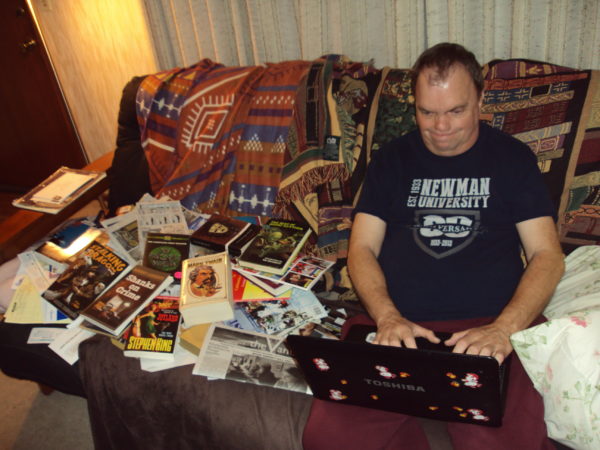
In an era where statues are being torn down and schools names are being changed, this column may be more topical than when I first came up with the idea a few months ago when grabbing at straws for ideas for columns. Namely, the subject of author’s personal lives and opinions and how or if that should affect how the writing is viewed.
I have written before about my affection for H.P. Lovecraft in spite of the author’s views on race and nationality (in “The Strange Bust of H.P. Lovecraft,” https://www.queerscifi.com/jeff-baker-boogieman-in-lavender-2/ ) from my vantage point as a Bi man in an interracial M/M relationship. But one of the authors caught up in controversy is far more topical.
J.K. Rowling was beloved by LGBT readers, and readers everywhere (except for far-right types who considered her work Satanic) until recent comments expressing a transphobic attitude. Now, readers don’t know what to think; to their immense credit, actors involved in the Potter franchise have been telling fans that this should not negate anything positive they got out of the books.
Loyola University Maryland has removed the name of author Flannery O’Connor from one of their buildings, citing racist attitudes in her early correspondence. O’Connor went on to challenge White attitudes towards race (including her own attitudes) in some of the best American short fiction ever written. Context is lacking in the dismissal of O’Connor. This article from the Jesuit American Magazine (https://www.americamagazine.org/arts-culture/2020/08/07/loyola-university-maryland-defends-decision-remove-flannery-oconnors-name states the case for keeping O’Connor’s name on the building far better than I can, as well as for the reading of O’Connor’s works. In my opinion, they are necessary reading for any student or writer of fiction, and are some of the best grotesques of the 20th Century.
More troubling are the early writings of L. Frank Baum. He was in his early thirties at the time of the Massacre at Wounded Knee and the Ghost Dance and Baum published two editorials that have tarnished his legacy. He referred to the defeated Natives as “untamed and untamable” and bluntly called for their extermination. He believed that the U.S. soldiers managing them were incompetent and that although we had wronged the Natives for centuries it was better to wipe them out rather than let them live defeated.
This is an appalling viewpoint that cannot be glossed over, but may be explained as being motivated by anger and ignorance. And Baum’s Mother in Law, Matilda Gage was a suffragette who was adopted into the Mohawk Nation; she lived with Baum and his family and doubtless would not have tolerated him if such attitudes prevailed with him. Baum’s later writings are more diverse and inclusive. And in 2006, some of Baum’s descendants apologized to the Sioux Nation.
Baum’s best work is still read; the popularity of “The Wonderful Wizard of Oz” has kept a good deal of his work in print and much of this is a landmark in the establishment of an American style of fantastic writing. Many of his short stories are neglected masterpieces, with “The Stuffed Alligator,” “The Enchanted Buffalo,” (which evokes Native American themes) and the satiric “The Glass Dog” benefiting from their well-crafted American settings.
When I started reading more mature short stories in grade school, I didn’t even pay attention to the names of the authors, let alone their life histories. It would be a decade or so before I started gleaning inspiration and warnings from the lives of the writers whose work I’ve enjoyed. Writers can be inspirational. Petty, boring, racist, heroic or just plain ordinary.
But they should be read.
Jeff Baker blogs about reading and writing sci-fi, fantasy and horror and other sundry matters on or around the fifteenth of every month. He lives happily with his husband Darryl and still remembers “The Wizard of Oz” was the first full-length book he ever read. He posts fiction (and other stuff) on his blog, https://authorjeffbaker.com/, and wastes time on Facebook at Jeff Baker, Author.https://www.facebook.com/profile.php?id=679510827


